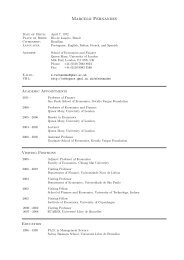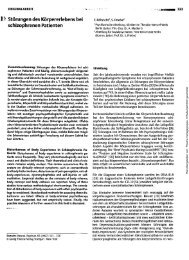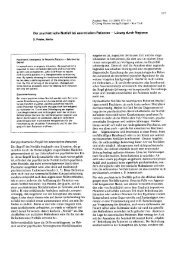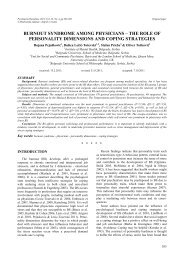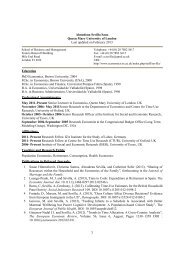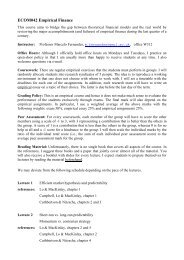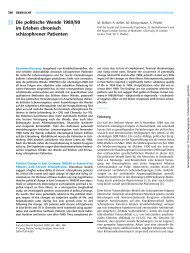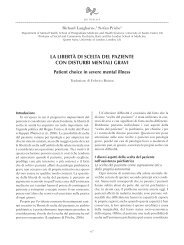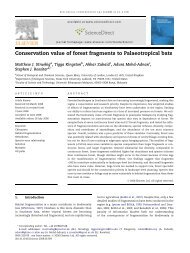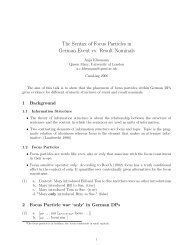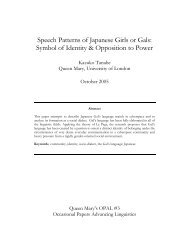Proofs - Personal Webspace for QMUL - Queen Mary, University of ...
Proofs - Personal Webspace for QMUL - Queen Mary, University of ...
Proofs - Personal Webspace for QMUL - Queen Mary, University of ...
Create successful ePaper yourself
Turn your PDF publications into a flip-book with our unique Google optimized e-Paper software.
© 2012 Elsevier Masson SAS. All rights reserved.<br />
European Psychiatry 27 (2012) / supplement n°2 / S17-S21<br />
ABSTRACT<br />
<strong>Pro<strong>of</strong>s</strong><br />
68767<br />
EUROPEAN<br />
PSYCHIATRY<br />
THE JOURNAL OF THE EUROPEAN PSYCHIATRIC ASSOCIATION<br />
Mental health <strong>of</strong> Turkish women in Germany: resilience and risk factors<br />
Z. Bromand b, *, S. Temur- Erman b , R. Yesil c , A. Heredia Montesinos b ,<br />
MC. Aichberger b , D. Kleiber d , M. Schouler- Ocak b , A. Heinz a , MC. Kastrup e , MA. Rapp b<br />
a Department <strong>of</strong> Psychiatry and Psychotherapy, Charité – Berlin, Germany<br />
b Department <strong>of</strong> Psychiatry and Psychotherapy at St Hedwig Hospital, Charité – <strong>University</strong> Medicine Berlin, Germany<br />
c Department <strong>of</strong> Epidemiology, Robert Koch- Institute, Berlin, Germany<br />
d Free <strong>University</strong> <strong>of</strong> Berlin, Institute <strong>for</strong> Prevention and Health Research, Berlin, Germany<br />
e Centre Transcultural Psychiatry, <strong>University</strong> Mental Health Centre, Copenhagen, Danmark<br />
Keywords:<br />
Turkish migrants<br />
Resilience and risk factors<br />
Mental health<br />
Women<br />
1. Introduction<br />
The process <strong>of</strong> migration is a signifi cant event in the lives <strong>of</strong><br />
migrants [14]. Migrants leave their home country to inhabit and<br />
re- establish themselves in a <strong>for</strong>eign country. In the migratory<br />
process they may be faced with a number <strong>of</strong> challenges including<br />
the need to learn a new language and adopt a new culture.<br />
Old coping strategies that were useful in the culture <strong>of</strong> origin<br />
may be ineffective or even counterproductive in new cultures.<br />
Hence, migration can be a major life event [29], characterized<br />
by adaptation and acculturation processes.<br />
The relationship between migration, stress and psychological<br />
strain has been investigated in several studies [6,25]. Several<br />
psychiatric disorders consisting <strong>of</strong> depressive disorders, post-<br />
traumatic stress disorder, and somatization disorder appear to<br />
* Corresponding Author.<br />
E-mail address: zohra.bromand@charite.de (Z. Bromand)<br />
ISSN 0924-9338<br />
June 2012<br />
Vol. 27 - Supplement n°2<br />
pp. S1-S81<br />
Migration<br />
and Mental Health<br />
S1 Editorial<br />
A. Heinz, U. Kluge<br />
S4 The willingness to participate in health research<br />
studies <strong>of</strong> individuals with Turkish migration<br />
backgrounds: barriers and resources<br />
D. Dingoyan, H. Schulz, M. Mösko<br />
S10 Socio-economic status and emotional distress<br />
<strong>of</strong> female Turkish immigrants and native<br />
German women living in Berlin<br />
MC. Aichberger, Z. Br omand, A. Heredia<br />
Montesinos, S. Temur-Erman, A. Mundt,<br />
A. Heinz, MA. Rapp, M. Schouler-Ocak<br />
S17 Mental health <strong>of</strong> Turkish women in Germany:<br />
resilience and risk factors<br />
Z. Bromand, S. Temur-Erman, R. Yesil,<br />
A. Heredia Montesinos, MC. Aichberger,<br />
D. Kleiber, M. Schouler-Ocak, A. Heinz,<br />
MC. Kastrup, MA. Rapp<br />
S22 The infl uence <strong>of</strong> stigma on depression, overall<br />
psychological distress, and somatization<br />
among female Turkish migrants<br />
A. Heredia Montesinos, MA. Rapp, S. T emur-<br />
Erman, A. Heinz, U. Hegerl, M. Schouler-Ocak<br />
S27 Translation and adaptation <strong>of</strong> the Zung<br />
Self-Rating Depression Scale <strong>for</strong> application<br />
in the bilingual Azerbaijani population<br />
F. Mammadova, M. Sultanov, A. Hajiyeva,<br />
M. Aichberger, A. Heinz<br />
S32 Construction and interpretation <strong>of</strong> self-related<br />
function and dysfunction in Intercultural<br />
Psychiatry<br />
A. Heinz, F. Bermpohl, M. Frank<br />
S44 Explanatory models and concepts<br />
<strong>of</strong> West African Malian patients<br />
with psychotic symptoms<br />
F. Napo, A. Heinz, A. Auckenthaler<br />
S50 How to express mental health problems:<br />
Turkish immigrants in Berlin compared<br />
to native Germans in Berlin<br />
and Turks in Istanbul<br />
A. Vardar, U. Kluge, S. P enka<br />
S56 Health services and the treatment<br />
<strong>of</strong> immigrants: data on service use, interpreting<br />
services and immigrant staff members<br />
in services across Europe<br />
U. Kluge, M. Bogic, W. Devillé, T. Greacen,<br />
M. Dauvrin, S. Dias, A. Gaddini, NK. Jensen,<br />
E. Ioannidi-Kapolou, R. Mertaniemi,<br />
R. P uipcinós i Riera, S. Sandhu, A. Sar vary,<br />
JFF. Soares, M. Stankunas, C. Straßmayr ,<br />
M. Welbel, A. Heinz, S. Priebe<br />
S63 The concept <strong>of</strong> “intercultural opening”:<br />
development <strong>of</strong> an assessment tool<br />
<strong>for</strong> the appraisal <strong>of</strong> its current implementation<br />
in the mental health care system<br />
S. P enka, U. Kluge, A. Vardar, T. Borde,<br />
D. Ingleby<br />
S 70 Cross-cultural training in mental health care<br />
– challenges and experiences from Sweden<br />
and Germany<br />
S. Bäär nhielm, M. Mösko<br />
S75 Teaching psychiatry and establishing<br />
psychosocial services – lessons<br />
from Afghanistan<br />
I. Missmahl, U. Kluge, Z. Br omand, A. Heinz<br />
S80 Epilogue<br />
A. Kleinman<br />
Background.- The purpose <strong>of</strong> the present study was to examine the protective and risk factors <strong>of</strong><br />
mental distress among Turkish women living in Germany.<br />
Method.- 105 Turkish immigrant women living in Berlin were investigated with measures <strong>of</strong><br />
extraversion/neuroticism (NEO- FFI), general self- effi cacy (GSE), social support (BSSS), social strain<br />
(F- SOZU) and mental distress (GHQ- 28). Interrelations between psychosocial variables were assessed<br />
using simple Pearson correlations.<br />
Results.- In all subjects, social strain (Pearson’s r=.26**, p=.008) and neuroticism (r=.34**, p



